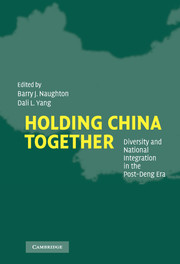Book contents
- Frontmatter
- Contents
- List of Figures and Tables
- List of Contributors
- Acknowledgments
- Holding China Together: Introduction
- PART ONE THE INSTITUTIONS FOR POLITICAL AND ECONOMIC CONTROL: ADAPTATION OF A HIERARCHICAL SYSTEM
- 1 Political Localism Versus Institutional Restraints: Elite Recruitment in the Jiang Era
- 2 The Institutionalization of Elite Management in China
- 3 The Cadre Evaluation System at the Grass Roots: The Paradox of Party Rule
- 4 Economic Transformation and State Rebuilding in China
- PART TWO CASE STUDIES OF POLICY IMPLEMENTATION
- Index
1 - Political Localism Versus Institutional Restraints: Elite Recruitment in the Jiang Era
Published online by Cambridge University Press: 08 December 2009
- Frontmatter
- Contents
- List of Figures and Tables
- List of Contributors
- Acknowledgments
- Holding China Together: Introduction
- PART ONE THE INSTITUTIONS FOR POLITICAL AND ECONOMIC CONTROL: ADAPTATION OF A HIERARCHICAL SYSTEM
- 1 Political Localism Versus Institutional Restraints: Elite Recruitment in the Jiang Era
- 2 The Institutionalization of Elite Management in China
- 3 The Cadre Evaluation System at the Grass Roots: The Paradox of Party Rule
- 4 Economic Transformation and State Rebuilding in China
- PART TWO CASE STUDIES OF POLICY IMPLEMENTATION
- Index
Summary
This chapter studies the formation of the new national and provincial elites during the era of Jiang Zemin. The focus is on two trends that have been unfolding in parallel, but in tension with each other. The first trend is growing political localism; the second is the strengthening of institutional control in an attempt to limit the abuses of power based on local interests and personal political networks. Political localism is stronger and more legitimate today than ever before in the history of the People's Republic of China. Indeed, more generally, through the reform era – but especially since about 1997 – conflicts of interest between regions, factions, and social groups have come more out in the open than ever before. At the same time, new institutional mechanisms have been put in place to limit favoritism and abuse of power by particularistic (including localistic) interest groups. The central government has made continual efforts to coordinate the multifaceted political demands raised by various regions and by new socioeconomic forces in this fast-changing country.
China's political and economic life during the Jiang era is filled with several seemingly contradictory trends. This is particularly evident in the recruitment of political leaders. On one hand, informal networks are ubiquitous in the formation of the new leadership. These networks includ regionally based groups (tongxiang, or fellow provincials), particularly the notorious Shanghai Gang, and those based on kinship with top leaders in Beijing (taizi, or princelings). Such favoritism and nepotism, however, have also caused a growing public demand, especially from backward inland regions, for a more representative leadership.
- Type
- Chapter
- Information
- Holding China TogetherDiversity and National Integration in the Post-Deng Era, pp. 29 - 69Publisher: Cambridge University PressPrint publication year: 2004
- 19
- Cited by



